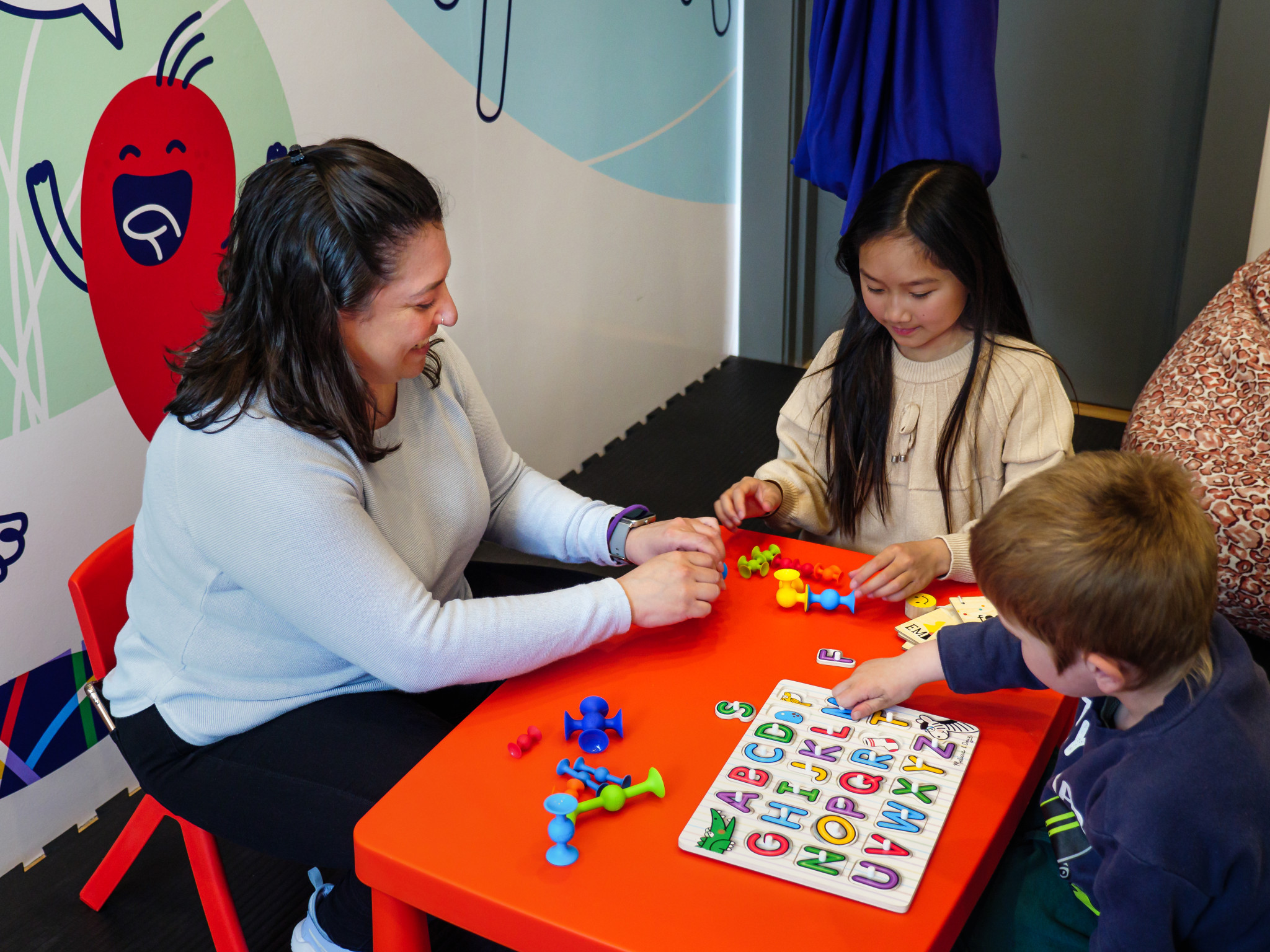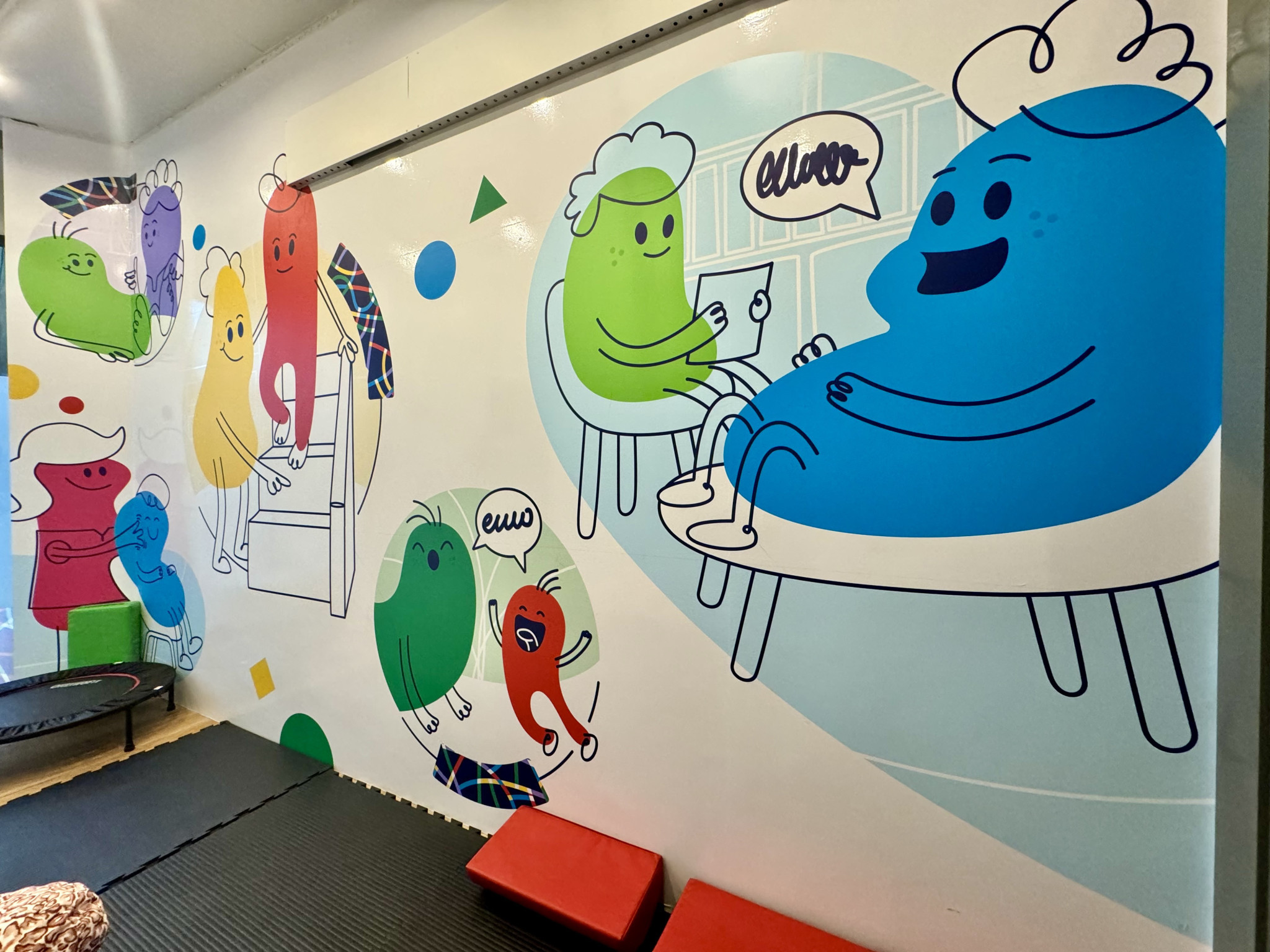At First Choice Allied Health, our team of speech pathologists support individuals of all ages who have difficulty with their speech, language, fluency (stuttering), voice, social skills, swallowing or experience fussy eating, we have therapists to assist.
Our highly trained therapists provide a client-centred approach to your care and can assist with a range of speech difficulties. Our team pride themselves on taking a “know better, do better” approach and are consistently engaging in professional development to ensure that they are bringing the most up-to-date evidence-based intervention to their clients.
Our Speech Pathology services are highly effective
Enhance complex communication needs
Improve production of speech sounds
Improve understanding and use of language
Improve literacy skills (reading and writing)
Better understand social situations and expectations
Improve fluency (reduce stuttering)
Swallow food and drinks safely
Improve fussy eating behaviour
Improve vocal concerns
Use Augmentative and Alternative Communication (AAC) tools
We ensure that we tailor our approach to meet your individual needs, focusing on your strengths, addressing challenges, and promoting overall wellbeing.
Who can benefit from our Speech Pathology services
First Choice Allied Health’s Speech Pathologists support children and adults within a wide range of clinical areas
From simple speech sounds through to swallowing difficulties and establishing communication through technology. We work with clients of all ages, presentations, skills and backgrounds including:
Developmental & Neurodivergent Communication Disorders
Speech Sound & Motor Speech Disorders
Medical, Genetic & Neurological Conditions
Voice & Swallowing Disorders
Developmental & Neurodivergent Communication Disorders
Developmental Language Disorders
Language Disorders associated with other diagnoses
(e.g. global developmental delay, intellectual disability, autism spectrum disorder, Down syndrome, cerebral palsy, ADHD)Autism Spectrum Disorder
Social Communication Skills
Alternative Augmentative Communication (AAC) for adults and children
Speech Sound & Motor Speech Disorders
Speech Sound Articulation Disorders
(e.g. a lisp)Phonological Disorder
(e.g. w/r sound substitutions)Childhood Apraxia of Speech
Stuttering / Dysfluency
Medical, Genetic & Neurological Conditions
Genetic, chromosomal, and metabolic syndromes
Neurodegenerative disorders
(e.g. Parkinson’s disease, dementia, Huntington’s disease)Acquired/Traumatic brain injuries
Aphasia
Dysarthria
Cognitive-communication difficulties
(e.g. memory, thinking
Voice & Swallowing Disorders
Voice disorders
(e.g. pitch modification, dysphonia)Dysphagia
(swallowing disorder)Fussy Eating
In most cases our Speech Pathologists begin with an initial assessment of communication, voice, and/or swallowing, which helps us in determining the most appropriate course of treatment to meet the individual needs and goals of the client.
How our Speech Pathology can help you
Using holistic and evidence-based strategies, our team of speech pathologists are here to support our clients with all of their communication and swallowing needs.
Whilst it is important to acknowledge that each child develops differently, it is equally important that parents and carers regularly observe whether their child/children are developing, meeting important developmental milestones. Early intervention is key to resolving emerging speech problems successfully.
Our team have extensive experience assessing, reporting on, and providing therapy to clients across a wide range of ages and practice areas. It is not uncommon for clients to have more than one of the identified disorders, and our speech pathologists can tailor a plan to address all of the areas you may need support with.
Ways our Speech Pathologist assess you
Receptive And Expressive Language
Understanding the information you’re receiving, whether that is concepts, directions or instructions, utilises an individual’s receptive language skills.
In some cases, receptive language issues are highlighted by an individual’s need to have instructions repeated, or by the observation that the individual has difficulty answering questions or completing tasks provided via verbal or written instruction.
Having trouble expressing your thoughts and ideas clearly is a sign of expressive language difficulties and can be extremely frustrating for the client.
Written schoolwork may be very brief with short sentences that may have words out of order.
Verbally the client may find it hard to re-tell a story or rely on gestures and actions to support their communication.
Functional daily tasks such as sending a text message or speaking over the phone may be impacted by expressive language difficulties.
Social Skills (Pragmatics)
Learning to interact in social settings is an important skill for all of us, but it’s not something that comes naturally to all individuals. Making and keeping friends can prove quite challenging especially if a person has language or speech difficulties, or autism.
Social skills sessions can boost self-awareness and self-esteem to help individuals build connections with their peers and others. In its simplest form, social skill development can support an individual on how to start, finish and continue conversations, read tone and body language, and think from the perspective of others. As a client transitions from adolescence to adulthood, the complexity of social skills can change, such as navigating interactions in the workforce, friendships and romantic relationships.
Therapy one-on-one or in a group setting
Social skills can be worked on in a one-on-one environment or as part of a group program, dependent on the client’s individual needs.
Conditions we can support
Having difficulty articulating and pronouncing sounds is a relatively common speech issue in children and can be the result of articulation errors or phonological errors. Our Speech Pathologists work with both children and adults with unclear speech and a variety of speech sound disorders. This can include:
Articulation errors are caused by not putting the lips, tongue or jaw in the correct position to make the right sound. Lisps are a common example of an articulation error.
Phonological errors occur when the individual does not understand the differences between sounds and how they are used.
Motor Speech disorders – including Childhood Apraxia of speech (CAS) – deficits of motor planning and programming and also Dysarthria is a motor speech disorder caused by muscle weakness or impaired coordination affecting speech clarity, speech volume and prosody (intonation).
Voice difficulties can present in children at an early age. Sometimes a child speaks too softly, sounds hoarse or husky, or their pitch is quite different to similarly aged children. Voice difficulties such as dysphonia can also arise as a result of an acquired brain injury such as stroke or neurodegenerative disease in adults.
They may also stem from physiological conditions such as vocal nodules or lesions, all leading to a different production in the individual’s voice. The voice can appear strained or hoarse and the voice volume can be too soft or loud. These factors can contribute to communication breakdown due to poor intelligibility.
Speech pathology can play a part in identifying the root cause of these concerns and assist to resolve the issue at hand. Our Speech Pathologists can also provide recommendations to other health professionals for further assessment including ENT (Ear, Nose and Throat).
Stuttering, also known as dysfluency, is a disorder of verbal communication where the flow of speech is disrupted by involuntary repetitions and prolongations of sounds, syllables, words, or phrases as well as involuntary pauses or blocks in which the individual is unable to produce sounds.
Stuttering often begins around 3-4 years of age, and early intervention works best. If a child is stuttering in the early primary school years, it is strongly recommended they undergo assessment and begin therapy in order to have the best chance of effective treatment and resolution.
Feeding issues and fussy eating can be the result of either oral motor feeding or sensory feeding issues.
Some children have difficulty moving or coordinating the muscles needed for eating which indicates oral motor feeding difficulties.
Sensory feeding difficulties can present as food avoidance based on texture or colour, or sometimes the desire to eat only a very limited array of food.
Our speech pathologists have been trained in the “Get Permission Approach” to feeding, which is a responsive, sensitive, and supportive approach to feeding therapy. "Get Permission" strategies lovingly support children and their families to create positive change at mealtimes.
Regardless of the cause of your child’s fussy eating, our therapists will work with your child to help manage their food and fluid safely and improve their ongoing relationship with food, with a responsive feeding therapy approach.
Dysphagia, or swallowing difficulties, can often present in adults with acquired brain injury such as stroke, or neurodegenerative conditions such as Parkinson’s disease or dementia. Dysphagia can present as difficulties in the oral phase of swallowing (chewing food) or pharyngeal phase (the swallow).
There can be a risk of aspiration and/or penetration where food or drink enters the airways and into the lungs due to disordered swallowing, leading to further health complications such as aspiration related pneumonia.
Our Speech Pathologists play a crucial role in evaluating and treating dysphagia.
They can assess swallowing function through observational methods and provide further recommendation and referrals to instrumental assessments such as a Video Fluoroscopic Swallow Study (VFSS). The Speech Pathologist will then develop a personalised treatment plan that may include dietary modifications, strategies to improve safety, and strengthening exercises with the goal to prioritise quality of life and safe and effective swallowing.
In simple terms, literacy refers to the ability of a person to read and write. The starting point for literacy is sound awareness, which is why speech therapists can play a key role in helping children who are having trouble learning to read and spell.
During the primary school years, it can be easy for children to fall behind. This might be noticed as a reluctance to read and write, regularly guessing words or struggling to sound out unfamiliar words. If you have any concerns about your child’s literacy progress, it is highly recommended to speak to a speech therapist a early as possible, to assess whether intervention is required.
Difficulties with literacy can present in adulthood when the individual is struggling to develop independence such as writing a resume to seek employment, or has difficulty navigating on public transport due to reading signs and instructions. Difficulties in literacy can also present with individuals with acquired brain injuries or neurodegenerative diseases, where their ability to successfully read or write is impaired. This can impact their ability to perform everyday tasks such as writing grocery lists or reading appointment times. Our Speech Pathologists can assess and provide tailored treatment plans that prioritise functional and client-focused goals for those with literacy difficulties or dyslexia.
Augmentative and Alternative Communication (AAC) is any form of communication for people with a range of conditions who have significant difficulties speaking or communicating. AAC may combine gestures, eye gaze, vocalisations and pointing to symbols as communication for people with limited verbal abilities. It can also include Key Word Sign and also speech generating devices.
We can support both children and adults, and their families, to use alternative and/or augmentative strategies and devices to optimise communication. By introducing AAC, our Speech Pathologist's empower individuals to express themselves, fostering greater independence and participation in their communities and daily lives.
Our Speech Pathology team provides extensive services
Formal and informal assessment and reporting across communication and swallowing
Provision of individualised recommendations and SMART goal setting
Receptive (comprehension) and expressive (use) language therapy
Social skills (pragmatic language) intervention
Speech sound disorders intervention
Vocal hygiene education and voice exercises
Stuttering programs
Swallowing and mealtime assessments and intervention
Literacy intervention
Alternative Augmentative Communication (AAC) assessments, funding application, and training
Specific individual and/or group therapy sessions
Parent coaching programs including the Hanen ‘More Than Words’ Program
Multidisciplinary autism assessments
Individual therapy - in clinic, at home/school (if applicable), via telehealth
Group therapy
Support in multidisciplinary care team meetings and liaison with key stakeholders
Areas we service
First Choice Allied Health is focused on providing expert Speech Pathology services to clients in Ascot Vale, Moonee Ponds, Essendon, Flemington, Travancore, Maribyrnong, Aberfeldie, and Kensington.
We also have a focus on the wider community and surrounding areas including:
Footscray
Brunswick
Coburg
Pascoe Vale
Parkville
North Melbourne
Carlton
West Melbourne
Docklands
South Melbourne
Yarraville
Sunshine
Albion
Thornbury
Preston
Northcote
Richmond
South Yarra
Port Melbourne
Williamstown
Tullamarine
Keilor
Oak Park
Fawkner




